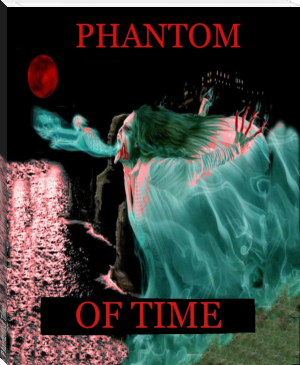The Truth about Angels - Ellen G. White (i like reading .TXT) 📗

- Author: Ellen G. White
Book online «The Truth about Angels - Ellen G. White (i like reading .TXT) 📗». Author Ellen G. White
Saul Encounters an Angel
[Saul] allowed his impulses to control his judgment, until he was plunged into a fury of passion. He had paroxysms of rage and madness, when he was ready to take the life of any that dared oppose his will.... It was David’s blameless character and noble fidelity that had aroused the wrath of the king; and he deemed the very life and presence of David cast a reproach upon him.... {TA 121.1}
He came to Ramah, and halted at a great well in Sechu. The people were coming together to draw water, and he inquired where Samuel and David were staying. When he was told that they were at Naioth, he made haste to reach that place. But the angel of God met him on the way and controlled him. The Spirit of God held him in its power, and he went on his way uttering prayers to God, interspersed with predictions and sacred melodies. He prophesied of the coming of Messiah as the world’s Redeemer. When he came to Naioth in Ramah, he laid aside his outer garments that betokened his station, and all day, and all night, he lay before Samuel and his pupils, under the influence of the divine Spirit.—The Signs of the Times, August 24, 1888. {TA 121.2}
Saul’s Séance at Endor and His Death
Again war was declared between Israel and the Philistines.... Saul had learned that David and his force were with the Philistines, and he expected that the son of Jesse would take this opportunity to revenge the wrongs he had suffered. The king was in sore distress.... On the morrow, Saul must engage the Philistines in battle. The shadows of impending doom gathered dark about him; he longed for help and guidance. But it was in vain that he sought counsel from God. “The Lord answered him not, neither by dreams, nor by Urim, nor by prophets.” ... {TA 121.3}
Then said Saul unto his servants, “Seek me a woman that hath a familiar spirit, that I may go to her, and inquire of her.” ... It was told the king that a woman who had a familiar spirit was living in concealment at Endor. This woman had entered into covenant with Satan to yield herself to his control, to fulfill his purposes; and in return, the prince of evil wrought wonders for her, and revealed secret things to her. {TA 122.1}
Disguising himself, Saul went forth by night with but two attendants, to seek the retreat of the sorceress.... Under the cover of darkness, Saul and his attendants made their way across the plain, and safely passing the Philistine host, they crossed the mountain ridge, to the lonely home of the sorceress of Endor.... {TA 122.2}
After practicing her incantations, she said, “I saw gods ascending out of the earth.... An old man cometh up, and he is covered with a mantle. And Saul perceived that it was Samuel.” ... {TA 122.3}
It was not God’s holy prophet that came forth at the spell of a sorcerer’s incantation. Samuel was not present in that haunt of evil spirits. That supernatural appearance was produced solely by the power of Satan.—Patriarchs and Prophets, 675, 676, 679. {TA 122.4}
The woman’s first words under the spell of her incantation had been addressed to the king, “Why hast thou deceived me? for thou art Saul.” Thus the first act of the evil spirit which personated the prophet, was to communicate secretly with this wicked woman, to warn her of the deception that had been practiced upon her. The message to Saul from the pretended prophet was, “Why hast thou disquieted me, to bring me up? And Saul answered, I am sore distressed; for the Philistines make war against me, and God is departed from me, and answereth me no more, neither by prophets, nor by dreams; therefore I have called thee, that thou mayest make known unto me what I shall do”. {TA 122.5}
When Samuel was living, Saul had despised his counsel, and had resented his reproofs. But now, in the hour of his distress and calamity, he felt that the prophet’s guidance was his only hope, and in order to communicate with Heaven’s ambassador, he vainly had recourse to the messenger of hell! Saul had placed himself fully in the power of Satan; and now he whose only delight is in causing misery and destruction, made the most of his advantage, to work the ruin of the unhappy king. In answer to Saul’s agonized entreaty came the terrible message, professedly from the lips of Samuel: {TA 123.1}
“Wherefore then dost thou ask of me, seeing the Lord is departed from thee, and is become thine enemy? ... Because thou obeyedst not the voice of the Lord, ... therefore ... the Lord will also deliver Israel with thee into the hand of the Philistines.”—Patriarchs and Prophets, 680. {TA 123.2}
When Saul inquired for Samuel, the Lord did not cause Samuel to appear to Saul. He saw nothing. Satan was not allowed to disturb the rest of Samuel in the grave, and bring him up in reality to the witch of Endor. God does not give Satan power to resurrect the dead. But Satan’s angels assume the form of dead friends, and speak and act like them, that through professed dead friends he can better carry on his work of deception. Satan knew Samuel well, and he knew how to represent him before the witch of Endor, and to utter correctly the fate of Saul and his sons.—The Spirit of Prophecy 1:376. {TA 123.3}
The Scripture account of Saul’s visit to the woman of Endor has been a source of perplexity to many students of the Bible. There are some who take the position that Samuel was actually present at the interview with Saul, but the Bible itself furnishes sufficient ground for a contrary conclusion. If, as claimed by some, Samuel was in heaven, he must have been summoned thence, either by the power of God or by that of Satan. None can believe for a moment that Satan had power to call the holy prophet of God from heaven to honor the incantations of an abandoned woman. Nor can we conclude that God summoned him to the witch’s cave; for the Lord had already refused to communicate with Saul by dreams, by Urim, or by prophets. These were God’s own appointed mediums of communication, and he did not pass them by to deliver the message through the agent of Satan. {TA 124.1}
The message itself is sufficient evidence of its origin. Its object was not to lead Saul to repentance, but to urge him on to ruin; and this is not the work of God, but of Satan. Furthermore, the act of Saul in consulting a sorceress is cited in Scripture as one reason why he was rejected by God and abandoned to destruction. “Saul died for his transgression which he committed against the Lord, even against the word of the Lord, which he kept not, and also for asking counsel of one that had a familiar spirit, to inquire of it; and inquired not of the Lord; therefore he slew him, and turned the kingdom unto David the son of Jesse.” 1 Chronicles 10:13, 14.—Patriarchs and Prophets, 683. {TA 124.2}
Chapter 11—Angels From David’s Time to the Babylonian Captivity
Chapter 11—Angels From David’s Time to the Babylonian Captivity
David’s Reign
The ark remained in the house of Abinadab until David was made king. He gathered together all the chosen men of Israel, thirty thousand, and went to bring up the ark of God. They sat the ark upon a new cart, and brought it out of the house of Abinadab. Uzzah and Ahio, sons of Abinadab, drave the cart. David and all the house of Israel played before the Lord on all manner of musical instruments. “And when they came to Nachon’s threshing-floor, Uzzah put forth his hand to the ark of God, and took hold of it, for the oxen shook it. And the anger of the Lord was kindled against Uzzah, and God smote him there for his error; and there he died by the ark of God.” Uzzah was angry with the oxen, because they stumbled. He showed a manifest distrust of God, as though He who had brought the ark from the land of the Philistines, could not take care of it. Angels who attended the ark struck down Uzzah for presuming impatiently to put his hand upon the ark of God.—Spiritual Gifts 4a:111. {TA 126.1}
With a view to extending his conquests among foreign nations, David determined to increase his army by requiring military service from all who were of proper age. To effect this, it became necessary to take a census of the population. It was pride and ambition that prompted this action of the king.... {TA 127.1}
The object of the undertaking was directly contrary to the principles of a theocracy. Even Joab remonstrated, unscrupulous as he had heretofore shown himself.... “Nevertheless the king’s word prevailed against Joab.” ... {TA 127.2}
The next morning a message was brought to David by the prophet Gad: “Thus saith the Lord, Choose thee either three years’ famine; or three months to be destroyed before thy foes, while that the sword of thine enemies overtaketh thee; or else three days the sword of the Lord, even the pestilence, in the land, and the angel of the Lord destroying throughout all the coasts of Israel. Now therefore,” said the prophet, “advise thyself what word I shall bring again to him that sent me.” {TA 127.3}
The king’s answer was, ... “Let us fall now into the hand of the Lord; for his mercies are great: and let me not fall into the hand of man.”—Patriarchs and Prophets, 747, 748. {TA 127.4}
Swift destruction followed. Seventy thousand were destroyed by pestilence. David and the elders of Israel were in the deepest humiliation, mourning before the Lord. As the angel of the Lord was on his way to destroy Jerusalem, God bade him stay his work of death.... The angel, clad in warlike garments, with a drawn sword in his hand, stretched out over Jerusalem, is revealed to David, and to those who are with him. David is terribly afraid, yet he cries out in his distress and his compassion for Israel. He begs of God to save the sheep. In anguish he confesses, “I have sinned, and I have done wickedly; but these sheep, what have they done? Let thine hand, I pray thee, be against me, and against my father’s house.”—The Spirit of Prophecy 1:385, 386. {TA 127.5}
The destroying angel had stayed his course outside Jerusalem. He stood upon Mount Moriah, “in the threshing-floor of Ornan the Jebusite.” Directed by the prophet, David went to the mountain, and there built an altar to





Comments (0)